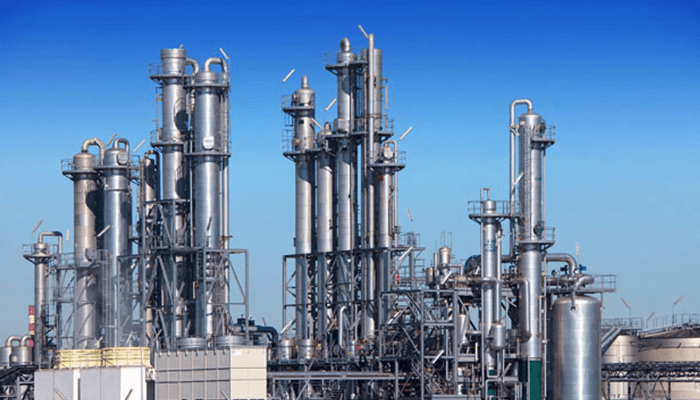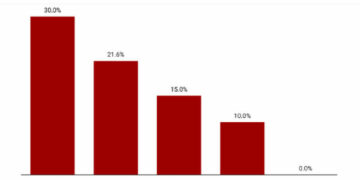Residents of Kapam community are on edge with the Kaduna Refining and Petrochemical Company (KRPC) over the destruction of their crops, animals and other means of livelihood by a chemical leakage linked to the company.
Some of the crops were at the point of harvest when the incident occurred on Wednesday, August 28, 2024.
When LEADERSHIP Weekend visited the area, the residents said their animals died from the toxic chemical leakage from the refinery.
According to them, the incident had rendered many farmers helpless as it destroyed their source of livelihood and posed a major threat to their health.
A tour of the area affected by the pollution showed that farms, once lush and green, now lay barren as the crops have withered. The air was thick with the smell of chemicals, and the once-clear stream ran murky and grey.
Residents, who initially thought it was just another bout of pollution, soon realised the gravity of the situation as the toxic fumes began to take a toll on their health.
The very pathetic situation led the affected community to stage a protest on Friday, August 30, 2024, where hundreds of them blocked the entrance to the KRPC, demanding compensation for damages caused by the toxic chemical discharge.
The protesters, mostly women, carried placards with inscriptions such as “KRPC has completely destroyed our crops” and “KRPC has poisoned us with toxic chemicals.”
Some of the protesters expressed their concern. One of the women, who simply identified herself as Madam Rose, described the impact of the chemical discharge on their community as devastating.
She said, “Our children are suffering because of the negligence of KRPC. They inhaled the toxic chemical and now they are lying in hospitals, fighting for their lives; we can’t afford to lose them. We demand justice and compensation for our suffering. The refinery must take responsibility for its actions and ensure that this never happens again.”
Other protesters also chorused, “We are worried about our health, but we have no access to medical care. Our food is contaminated, and we are struggling to survive. KRPC needs to step in and provide us with the necessary assistance. We can’t do this alone.”
“We can’t continue to live in an environment that’s toxic and harmful to our health,” a youth leader, Mr Ibrahim Mohammed said.
“We want the refinery to take responsibility for their negligence and clean up the mess they have created,” he added.
A community leader, Jatau, expressed the people’s frustration thus, “We have endured years of neglect, but this latest incident has pushed us to the breaking point. We demand comprehensive compensation for our losses and immediate action to mitigate the environmental and health impacts of the refinery’s operations.”
Another victim, Chief Mike Ogaba-Ojah, said he lost hundreds of chicken worth millions of naira. “I was away when the incident occurred. When I returned, I was met with the devastating sight of my poultry in ruins,” he said.
Also, Engr Orji Emmanuel, who is also a farmer said, “I lost almost N2 million worth of crops,” adding that, “My children were also affected by the chemical. They complained of having difficulty breathing and I had to rush them to the hospital.”
Mr Felix Sunday, who was also affected by the pollution, estimated his loss at over N1 million. “The chemical discharge was like tear-gas,” he said. “We ran for our lives. I considered it negligence on the part of the refining company not to have notified us.”
A 65-year-old geologist and victim of the chemical emission, John Atabor, shared his heartbreaking story. The chemical discharge not only destroyed his crops such as maize, sweet potatoes, soya beans and rice but also affected his family’s health. “My children and some members of my immediate family were affected by the chemical emission and we had to seek medical treatment,” he said.
Atabor expressed frustration that the KRPC did not notify them before releasing the chemical, which would have allowed them to take necessary precautions. “We know we couldn’t have stopped them from releasing the chemical, but they ought to have told us so that we could have taken the necessary precautions for protection,” he said.
Atabor said he took a loan of N5 million from a bank, which is now gone. “I came to the village to network with them on how to promote a green economy to mitigate climate change. That’s why I’m in the village,” he said. However, the chemical emission has thwarted his efforts.
“We woke up one morning to find our farms destroyed, our animals dying and our children struggling to breathe,” a community leader, Mrs Sarah John said. “We didn’t know what was happening until we saw the refinery’s pipes leaking toxic substances into our environment,” she added.
Meanwhile, the National Environmental Standards and Regulations Enforcement Agency (NESREA), has confirmed that preliminary findings point to ruptured pipes as the source of the toxic emission. The Kaduna State government has promised to take action, but the community remains skeptical.
“We’ve heard promises before, but nothing has changed,” Mrs John said. “We want concrete actions, not empty promises. Our lives are at stake.”
The victims of the chemical leakage are no fewer than 500 who are anxiously waiting for due compensation for the disaster caused.
In the words of one of the worst-hit, Pastor Akiola Olunoade, “We are appealing to the federal government to help us. We have lost everything. Our farms, our crops, our livelihoods. We need help to restore our lives.”
He estimated the destruction caused to his farm to about N5 million, including food crops and energy crops like coconut, mangoes and cashews.
Our correspondent who visited the Kaduna Ministry of Environment to know what the state government was doing to get justice for the community met with the director of Environment and Pollution Control, Yusuf Muazu Usman.
He said, “When we received the report of the incident, a meeting of relevant stakeholders was convened. Thereafter, the ministry delegation paid a visit to the traditional ruler of the area where the incident was further confirmed and assistance to contain the situation was given. Again, it was agreed that due compensation will be paid to the affected victims.
“We also met with the management of the KRPC to authenticate the matter which they confirmed to be true. We proceeded to visit the affected areas and saw the situation with measures being taken to address it. KRPC agreed to pay compensation and prevent a recurrence.
“For us as a government, we will follow up the matter until due compensation is paid to the victims and also ensure that there is a sustained measure to prevent it occurring again.”
When one of Nissi community leaders, Mike Ogaba-Ojah, was called to confirm the state of the situation regarding the compensation, he said, “we are yet to be compensated oo; we are still waiting for the agreed compensation but nothing yet.”
When our correspondent visited the KRPC to see the public affairs manager, Mallam Mahmood Jimoh, he was said not to be in the office and nobody could speak on his behalf.
Our correspondent put a call through to his known mobile line severally, but he failed to pick the calls and did not return any of them.
A text message was sent to his mobile phone and to his WhatsApp number on October 31, 2024, which he ignored.
The message read: “Good afternoon Sir. We need a reaction as to whether the KRPC has paid compensation to the community affected by the chemical leakage.”





